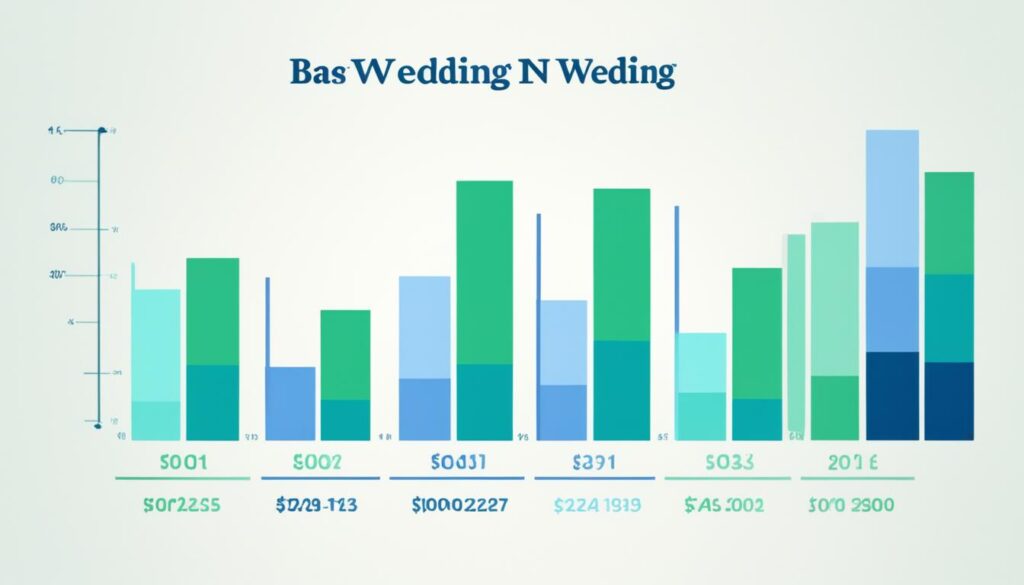Did you know that the average cost of a wedding in the U.S. surged to $35,000 in 2023, representing a staggering $5,000 increase from the previous year? This rising trend has many couples contemplating a crucial financial question: should I save for a wedding or invest for the future? As wedding savings become a significant part of modern financial planning, it’s essential to evaluate the implications of both options carefully. With 74% of couples overspending by an average of $7,900, financial planning is critical when navigating the complexities of wedding expenses and future financial goals12 In today’s world, where financial independence is highly valued, couples face the challenge of balancing their immediate desire for a dream wedding against the need for long-term financial health.
Key Takeaways
- Understanding average wedding costs helps in realistic budgeting.
- Financial planning is essential to avoid overspending.
- Couples need to assess their priorities regarding saving vs. investing.
- Identifying savings opportunities can ease financial pressures.
- Making informed choices can ensure both a memorable wedding and future stability.
Understanding the Costs of a Wedding
Planning a wedding involves thorough wedding budgeting to ensure all expenses are accounted for. Understanding average wedding costs in the United States is crucial for couples embarking on this life event. In 2024, the average cost of a wedding is projected to be $33,000, reflecting a shift from previous years3. This amount encompasses a variety of services and products, such as venue selections and catering options.
Average Wedding Costs in the U.S.
A breakdown of different cost components illustrates how couples might allocate their resources. For instance, venue expenses typically range from $6,000 to $12,000, with luxury locations commanding up to $75,0003. On the lower end, couples planning a courthouse ceremony can expect costs around $30 to $100, depending on the location4. More average costs are as follows:
| Item | Estimated Cost |
|---|---|
| Average Wedding Cost | $33,000 |
| Average Venue Costs | $6,000 – $12,000 |
| Average DJ Services | $1,000 |
| Average Cost of Engagement Ring | $6,000 |
| Average Cost of Wedding Dress | $1,000 – $2,000 |
| Food and Drink Costs | $8,176 |
Different Factors Influencing Wedding Expenses
Several factors can cause variations in wedding expenses. Location is key; for example, New York City has the highest average wedding costs among major metro areas3. Financial stress is common during wedding planning, with 70% of engaged Americans reporting such challenges4. Couples may consider trimming their guest list or choosing off-peak months to save costs4. This strategic wedding budgeting can alleviate some financial pressures while ensuring a memorable celebration.

Should I Save for a Wedding or Invest for the Future?
When considering whether to save for a wedding or invest for the future, couples must carefully evaluate their financial goals. Significant factors include the immediate costs associated with weddings and the long-term benefits of sound financial planning. Statistics reveal that the average wedding in America costs around $35,000, with many couples feeling compelled to go into debt to cover these expenses5. Setting a budget based on expected costs will help individuals focus on their financial objectives and measure the impact of their spending decisions.
Evaluating Your Financial Goals
A clear understanding of personal financial goals often determines whether to save for a wedding or invest for the future. Experts recommend that individuals save 40% of their income for major purchases, which could apply to both wedding planning and future investments6. Taking time to plan helps in deciding the right amount to allocate monthly toward wedding expenses. By evaluating the pros and cons of each approach, couples can create a more tailored financial strategy.
Immediate Costs vs. Long-Term Benefits
Short-term wedding expenditures can overshadow long-term financial benefits. For instance, engaging in financial planning to cut wedding costs might provide surplus funds for vital investments, such as a down payment on a home5. Investing funds wisely can lead to greater returns, particularly when factoring in capital gains tax rates which stand at 15% on earnings6. Couples should carefully assess the immediate costs versus the potential long-term gains from investments while recognizing that saving for a wedding can sometimes lead to unnecessary debt.

Creating a Budget for Your Wedding
Establishing a wedding budget is a fundamental step in the financial planning process for your special day. With the average cost of a wedding in 2024 projected at $33,000, up from $29,000 the previous year, it’s crucial to have a clear financial framework to avoid overspending7. Couples should start by discussing potential financial contributions with all parties involved. Identifying who will cover which costs can provide clarity and prevent misunderstandings down the line.
Steps to Develop a Realistic Wedding Budget
To develop a comprehensive wedding budgeting plan, consider these key steps:
- Break Down Costs: Categorize expenses, including venue, catering, attire, and entertainment, to see where your funds will be allocated.
- Research and Compare: Explore various services and vendors, as costs can vary significantly. Aim for the best value for your needs.
- Establish Priorities: Decide what elements of the wedding are most important to you and allocate funds accordingly.
- Account for Additional Expenses: Remember to include miscellaneous costs, as about 74% of couples exceed their initial budgets by overlooking smaller expenses7.
Identifying Savings Opportunities
Finding ways to enhance wedding savings can significantly impact your overall budget. Consider methods like:
- DIY Projects: Create invitations or decorations yourself to save money while adding a personal touch.
- Community Support: Engage family and friends for help; many may be willing to lend their talents, whether in photography, catering, or organizing.
- Off-Peak Timing: Consider scheduling your wedding during less popular months or days to take advantage of lower venue prices.
By taking these steps and thinking creatively, you can stick to your wedding budget without compromising the quality of your event. Appropriate financial planning and awareness of savings opportunities allow couples to enjoy their special day fully, putting any potential financial stress aside.
Pros and Cons of Wedding Savings
When looking to fund a dream wedding, many couples find themselves weighing the pros and cons of focusing primarily on wedding savings. One significant benefit is the sense of financial control that comes with setting aside tangible amounts. With the average cost of a wedding in 2022 being approximately $30,0008, couples who save diligently can reduce their stress levels by knowing they can afford the event they desire. Engaging in this financial planning can help tailor their big day to their personal preferences without undue reliance on external sources of funding.
Benefits of Saving for a Dream Wedding
Saving for a wedding not only leads to a well-planned ceremony but also fosters a sense of achievement. Couples tend to save anywhere from $10,000 to $20,000 over an engagement period averaging about 18 months9. This structured approach can help reinforce a couple’s financial habits and prepare them for future shared financial goals. Furthermore, setting aside specific monthly contributions, such as $200 to accumulate a total of $12,000 over five years, emphasizes the power of small savings over time9.
Potential Drawbacks of Focusing Solely on Savings
However, there are potential drawbacks to concentrating solely on savings for a wedding. By prioritizing immediate expenses, couples may inadvertently postpone other critical investments, such as buying a home or saving for retirement. Conventional mortgages often require substantial down payments, and setting aside funds for immediate goals may hinder one’s ability to invest long-term8. Financial experts recommend a balanced approach that considers both short-term celebrations and long-term stability, allowing couples to navigate the fine line between wedding savings and other important future investments10.
FAQ
Should I prioritize saving for my wedding or investing for future expenses?
How can I effectively budget for my wedding?
What are the average costs associated with planning a wedding?
What potential drawbacks should I consider if I focus solely on saving for my wedding?
How can I identify savings opportunities while planning a wedding?
Why is it important to discuss financial goals with my partner before wedding planning?
Source Links
- https://www.investopedia.com/financial-edge/0212/how-to-save-for-a-wedding.aspx
- https://fortune.com/recommends/banking/how-to-save-for-your-wedding/
- https://www.forbes.com/advisor/personal-loans/average-cost-of-a-wedding/
- https://www.nerdwallet.com/article/finance/how-much-does-average-wedding-cost
- https://www.gobankingrates.com/saving-money/relationships/reasons-cut-back-wedding-costs-save-invest-money/
- https://moneywithkatie.com/blog/planning-for-big-purchases-saving-or-investing
- https://www.wsj.com/buyside/personal-finance/financial-tips/how-to-plan-a-wedding-budget
- https://www.experian.com/blogs/ask-experian/how-do-you-save-for-a-wedding-and-a-house-at-the-same-time/
- http://www.theluxestrategist.com/save-wedding-even-youre-single/
- https://hermoney.com/connect/marriage/financial-pros-and-cons-of-marriage/

